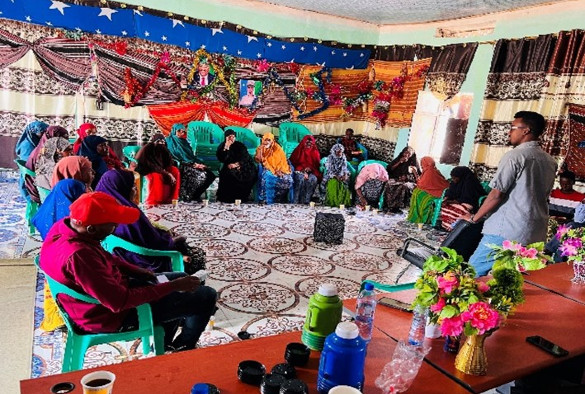
Farah Isse Mumin is a PhD student at the University of Liverpool and a research fellow at the International Livestock Research Institute (ILRI) in Ethiopia.
As a veterinarian from Somalia, I am deeply interested in enhancing the health and livelihoods of pastoral communities through One Health approaches, which recognize the interconnectedness of human, animal, and environmental health. I envision a future with accessible and affordable healthcare for vulnerable communities and their animals, including pastoralists and displaced people. This vision aligns with my PhD research which focuses on strategies for effective community engagement on One Health hazards – zoonotic diseases (those which spread from animals to humans), food safety and antimicrobial resistance – in pastoral and agropastoral settings in the Horn of Africa.

About my research
My PhD research has three interlinked studies. The first aims to identify zoonotic disease priorities of pastoralists using a newly-developed tool that combines participatory approaches and criteria-based decision-making techniques. The exercise takes about 2-3 hours of interactive discussion and culminates in an agreement on local priority zoonotic diseases and the identification of corresponding actions. This work builds on existing participatory ranking methods (which are often subjective) and will complement existing tools for national zoonotic disease prioritization (which typically target high-level stakeholders and are not suitable for use with community members).
The second component aims to develop and validate an instrument to assess knowledge, attitudes, and practices (KAP) related to One Health hazards which is suitable for use in pastoral and agro-pastoral settings in the Horn of Africa. In the third component, I will use the KAP as a baseline and endline survey, as well as qualitative methods to evaluate the impact of a community conversation intervention designed to facilitate awareness and behaviour change to reduce the health risks associated with zoonotic diseases, food safety hazards, and antibiotic resistance.
The research is being conducted in southern Somalia and Ethiopia, with funding from the HEAL and OHRECA projects at ILRI, as well as in Kenya through the CGIAR One Health Initiative. Activities were expanded into northern Somalia, including Puntland state, with support from the Policy Fund at the University of Liverpool.
My visit to Puntland State of Somalia
During a recent visit to Puntland, I conducted ten community zoonoses prioritisation exercises, engaged 45 pastoralists in our community conversation intervention and trained government field staff on some of the tools we developed. Participants appreciated how our activities involved them in an engaging and easily understandable manner. For instance, one participant from Godad village in Mudug region remarked on how the approach contrasts with the traditional top-down training methods, locally known as “Tababar Haayadeed” (NGO-led Training). She noted: “Many of us neither read nor write, but usual community seminars use flipcharts and written messages to teach us something. This approach is community dialogue-based, where we were asked about our experience and knowledge and ultimately allowed us to lead the discussion.”
Preliminary findings indicate that the zoonotic diseases prioritized by the community largely align with Somalia’s national priorities. Brucellosis, anthrax, childhood zoonotic enteric diseases, rabies, and skin lesions emerged as the most frequently prioritized health risks associated with livestock across the Puntland sites
When comparing zoonotic diseases with those specific to animals or humans, animal-specific diseases were the most concerning, followed by human-specific and zoonotic diseases. This emphasizes the high priority placed on animal health in this setting, with human health including zoonoses being of lesser concern. The community conversation work is ongoing, but the approach has already shown promise as a tool for effective community engagement in pastoral settings.
I visited the Puntland Ministry of Livestock and Animal Husbandry (MoLAH) to advocate for adoption of our community engagement tools into policy and practice. The Ministry showed particular interest in implementing the community conversation approach as a replacement for their traditional, poster-based community education approach. Subsequently, on invitation from the Minister and with support from the Policy Fund award, I trained 22 MoLAH field staff on the CC facilitator guide we developed for the HEAL project, culminating in a practical application of the approach in a nearby community. The Ministry is now supporting the rollout of the approach in four pilot sites. They are also planning to develop their own community conversation manuals, based on our approaches.










